NEWSLETTER
Subscribe to receive the latest news and performance tips.
+36 70 426 8841 | support@hammer-nutrition.hu
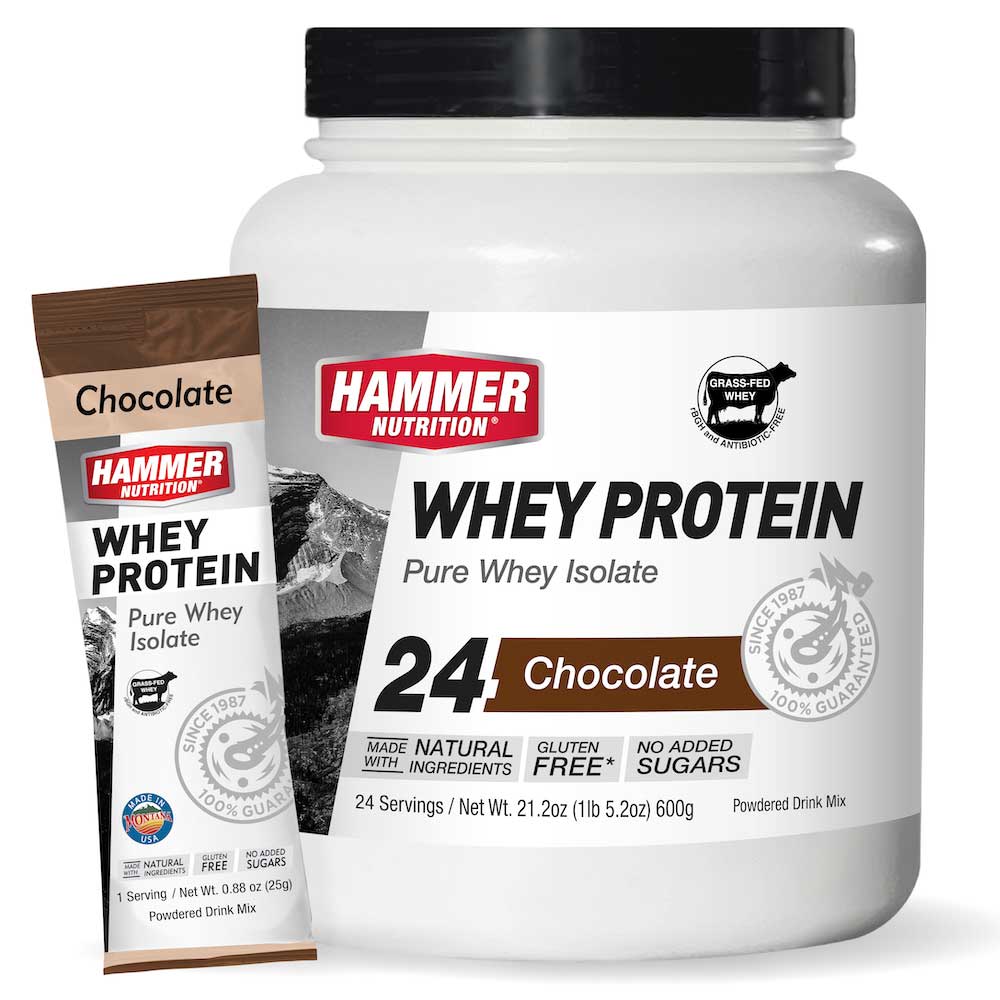

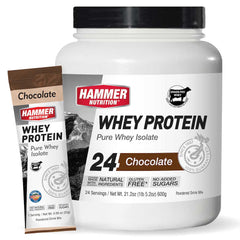
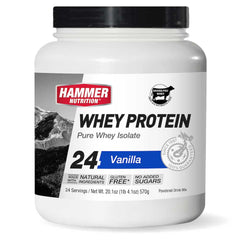
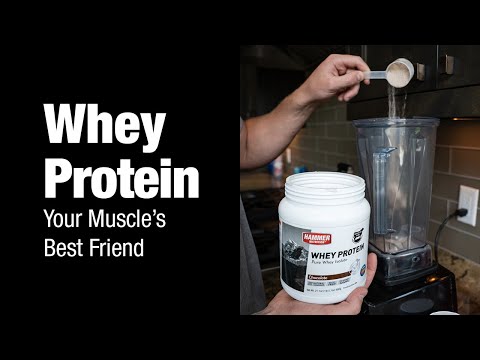
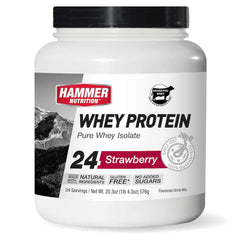
Your Muscles’ Best Friend
Unflavored available in 27 servings only
Try Whey Protein and more with the Complete Powder Sampler Kit
To feel and perform your best, day after day, your protein needs must be met. Doing so is easy with Hammer Nutrition’s Whey Protein, which contains 100% whey protein isolate, the most bioavailable protein on the planet. Hammer’s Whey Protein is super pure—free of lactose, fat, and added sugar, and is derived from US-raised, grass-fed, hormone-, and antibiotic-free cows. A whopping six grams of the multibeneficial amino acid, L-glutamine, are added for additional health benefits.
Every serving (1 scoop) of Whey Protein contains 15 grams of 100% whey protein isolate and 6 grams of glutamine. For athletes doing a purely strength workout (e.g. a weight training session in the gym), consuming 1 scoop of Whey Protein immediately after the workout is a great to provide the lean muscle tissue with the amino acids it needs to repair and rebuild. The glutamine in the product, among its many benefits, is ideal for helping maintain a strong immune system. Consuming 1 scoop of Whey Protein prior to bedtime is also a highly beneficial practice—the body receives an excellent dose of amino acids, which it will use during a time (sleep) when it does many of its reparation/recuperative processes, and the glutamine will elevate serum human growth hormone (hGH) levels, which has anabolic (muscle building) effects. Lastly, a serving of Whey Protein taken any time during the day is an excellent way to bolster your daily protein intake, helping you reach your optimal amount.
Every serving (2 scoops) of Recoverite contains 10 grams of the same exact whey protein isolate that's in Whey Protein, as well as 3 grams of glutamine. Every serving of Recoverite also contains 33 grams of complex carbohydrates; Whey Protein contains only 0-1 grams of naturally occurring carbohydrates (no added carbohydrates). Unlike a "strength only" workout, immediately after an aerobic/endurance workout the body needs these carbohydrates to replenish and increase depleted glycogen stores. Both the protein and glutamine components in Recoverite assist in the glycogen restoration process. The protein also supplies the amino acids needed to help repair and rebuild the muscle, and the glutamine supports healthy immunity. Recoverite (but not Whey Protein) also contains the trace mineral chromium polynicotinate (ChromeMate®), which maximizes insulin functioning (very important in the glycogen restoration process), and l-carnosine, which is a powerful antioxidant.
Yes, Hammer Nutrition products are tested for heavy metals and meet or better established safety levels. The manufacturer of Hammer Nutrition supplements requires that all potential raw material suppliers provide a Certificate of Independent Laboratory Analysis-covering no less than 15 specific items-with EVERY shipment of raw material. One of those specifics is this:
Statement of, and References to, Industry Accepted Methods of Analytical Processes to establish that Raw Material meets FDA standards for microbial content, heavy metals, solvents, and pesticides, and results of such analysis. (Must be detailed and include the Name, Contact Person, and Phone Number of the Independent Laboratory that conducted this Testing).
BOTTOM LINE: Hammer Nutrition supplements are tested for heavy metals, with all raw materials in them meeting or bettering FDA standards.
Q: In reviewing the Whey Protein product, the protein per serving is 15 grams, which seems low in comparison to other protein products. Your thoughts?
A: Each scoop of Whey Protein contains 15 grams of whey protein isolate, which, compared to other protein sources, is the superior protein source for a number of reasons (see the articles Hammer Whey Protein and Stay Strong and Stay Healthy for more). In each scoop there is also 6 grams of the multi-beneficial amino acid glutamine, which provides dozens of benefits of its own. Other protein powders may have more grams of protein in a serving, but oftentimes they're mostly a blend of a bit of whey protein isolate, whey protein concentrate (a lower-quality form of whey protein), and casein protein, the latter being one that we do not consider to be a quality protein source.
Q: Is there a reason Whey Protein does not have l-leucine in it, which helps maximum protein synthesis?
A: Whey Protein is 100% isolate and each scoop supplies 1649 mg of l-leucine. Whey protein isolate is the richest source of all nine essential amino acids, including the three branched-chain amino acids, l-leucine, l-isoleucine, and l-valine.
No scoop? No problem! With the following conversion information, your "Where did my scoop go?" problems are resolved!
Hammer Whey
1 Level Scoop (53 cc) = 3 TBSP + 1.75 tsp
Here is the amino acid profile in one scoop of Whey Protein. Note that the amounts are in milligrams.
Alanine 710.00
Arginine 371.25
Aspartic Acid 1540.00
Cystine 316.875
Glutamic Acid 2511.25
Glutamine 714.375
Glycine 281.25
Histidine 253.125
Isoleucine 806.875
Leucine 1520.00
Lysine 1304.375
Methionine 374.375
Phenylalanine 388.75
Proline 776.875
Serine 743.125
Threonine 1010.00
Tryptophan 221.875
Tyrosine 398.75
Valine 756.875
NOTE: 6000 mg of Glutamine are added to each scoop of Whey Protein
Here are the following supplements that will be really helpful in not only fully healing the bone, but to strengthen it more and more.
1) Premium Insurance Caps. Many nutrients contribute to bone health, and, of course, overall health. Vitamin C, vitamin D, vitamin B6, magnesium, calcium, selenium, zinc, and more play a bone-healing role. Suggested dose: 2 capsules 2-3 times daily.
2) Essential Mg. For too long, people have been under the impression that taking lots and lots of calcium was necessary to help with bone healing and also to help prevent osteoporosis. And while calcium is indeed an important nutrient, it's actually magnesium that is the most important... and for a slew of reasons in addition to bone health. It is so important, in fact, that we’ve included an article regarding magnesium's role in bone health...
Magnesium – Mightiest Mineral for Bone Health
By: Steve Born
In Endurance News #103, I wrote about an article that discussed the importance of magnesium in maintaining optimal bone health (Magnesium: The most important mineral for bone health). The bottom line was that while calcium, vitamin D, and a couple other nutrients certainly play a role in bone health, I believe that it is magnesium that is “driving the train.” A portion of the article states:
A strong case can be made for magnesium as the most important component for bone health instead, especially because magnesium is necessary for the proper utilization of vitamin D and calcium.
Dr. Susan Brown writes, “Since magnesium participates in an astonishing array of biochemical reactions, it’s no surprise that it’s essential for healthy bones. Most notably, adequate magnesium is essential for absorption and metabolism of calcium.”
More recent research appears to confirm this rationale. A study [1] conducted by researchers from the Universities of Bristol and Eastern Finland showed that higher serum levels of magnesium greatly decreased the risk of bone fractures.
The researchers followed nearly 2,250 middle-aged men over a 20-year period and found that the risk of having a bone fracture—particular a fracture of the hip—was decreased by an astounding 44% in men with higher blood levels of magnesium. Researchers also noted that the 22 men with the highest magnesium levels had no incidence at all with bone fractures over the entire 20-year period.
Lead researcher, Dr. Setor Kunutsor, states: "The findings do suggest that avoiding low serum concentrations of magnesium may be a promising though unproven strategy for risk prevention of fractures."
While magnesium arguably being the key mineral for bone health—including the very real potential for helping prevent fractures—may be news for some, magnesium expert, James South, wrote about it decades ago. In his hallmark article “Magnesium, The Key to Health and Life,” and referencing the work of Dr. Guy Abraham from the early 80’s, South writes:
"Magnesium stimulates release of the hormone calcitonin, which drives calcium into the bones where it belongs, and out of the soft tissues where it doesn't. A high-calcium, low-magnesium diet and cellular environment will thus tend to favor calcification of soft tissues as osteoporosis gradually develops. Abraham points out that Asian and African diets are low in calcium (300 to 500 milligrams daily), yet high in magnesium, and osteoporosis is not more common in Asia and Africa than in Europe and America, where daily calcium intakes from high-dairy diets are often 800 to 1,000 milligrams daily, combined with low magnesium."
Abraham notes, "When patients with severe osteoporosis were given massive doses of calcium they went into positive calcium balance, but radiographic studies revealed no change in the osteoporotic process. Where did that calcium go? Obviously into the soft tissues where it does not belong.” Abraham adds, “Magnesium has a calcium-sparing effect and decreases the need for calcium.” [2]
This exciting new research, along with previous studies, confirms the key role that magnesium plays in bone health.
As I’ve mentioned before, “Unfortunately, while magnesium is contained in a variety of foods, the overall degradation of our food supply has caused the average American intake to decline to amounts significantly below Optimum Daily Intake (ODI) levels. Therefore, to ensure you’re obtaining adequate amounts of magnesium, select foods that contain substantial levels of this vital mineral (seeds and nuts are good sources), and augment your intake with additional amounts of magnesium via supplementation.
Essential Mg contains five forms of highly bioavailable magnesium. From supporting optimal bone health to so much more, Essential Mg is an ideal way to ensure that you’re receiving optimal amounts of this all-important, health-benefiting mineral.
REFERENCES:
[1] Setor Kwadzo Kunutsor, Michael Richard Whitehouse, Ashley William Blom, Jari Antero Laukkanen. Low serum magnesium levels are associated with increased risk of fractures: a long-term prospective cohort study. European Journal of Epidemiology, 2017; DOI: 10.1007/s10654-017-0242-2
[2] Abraham G. The calcium controversy. J Appl Nutr 1982, 34:69-73.
Suggested Dose: 2 Essential Mg in the morning, 1 at lunchtime or early afternoon, and 1-2 at bedtime (at night, magnesium is very helpful for helping the muscles and nerves relax).
3) EnDuro D. There are far too many benefits of vitamins D3 and K2 to include here, so I’d encourage you to read the article New Product Alert - EnDuro D, as it provides more detailed information about this all-important product. Regarding bone health, the benefits from vitamin D3 supplementation are to support proper utilization of calcium to optimize bone density and overall bone health. Vitamin K2 works with vitamin D3 for supporting bone health by activating a protein called osteocalcin, which helps keep calcium out of the arteries while increasing the amount of calcium in the bones (teeth as well). Suggested Dose: 1 capsule is a sufficient amount on a daily basis. For bone repair, 1 capsule twice daily is suggested.
4) Boron. This trace mineral is extremely important for many aspects of health, and it is vitally important for maintaining and improving bone health because of the role it plays in assisting with the bone-building effects of calcium, magnesium, and vitamin D. Studies show that adequate intake of boron reduces the loss of calcium and magnesium excreted in the urine. That ensures that more of these two important minerals stay in the body. Suggested Dose: Exactly the same as EnDuro D.
5) Whey Protein. A lot of people don’t think about protein when it comes to bone health, but this bit should convince otherwise. Bone can be imagined as being somewhat like a sponge made of living protein upon which mineral crystals are embedded. By volume, roughly half of bone is comprised of protein. When a fracture occurs, the body is called upon to gather protein building blocks together to synthesize a new structural bone protein matrix. In addition, protein supplementation increases growth factors like insulin-like growth factor-1 (IGF-1), a polypeptide that exerts a positive effect on skeletal integrity, muscle strength, immune response, and bone renewal. Protein malnutrition or under-nutrition leads to a “rubbery” callus, compared to the rigid calluses of those with adequate or high protein intake. Numerous studies document the acceleration of fracture healing with even a modest 10- to 20-gram increase in protein intake. The benefits of supplemental protein are important to everyone and especially important to those with malnutrition or low baseline protein intake. In fact, among elderly hip fracture patients, poor protein status at the time of fracture predicts fracture outcome. Those with low protein status take longer to heal, and have more complications, including death.
Specific amino acids of special importance include lysine, arginine, proline, glycine, cystine, and glutamine. Lysine, for example, is known to enhance calcium absorption, increase the amount of calcium absorbed into the bone matrix, and aid in the regeneration of tissue.
Suggested Dose: 1 scoop of Hammer Whey protein mixed in water only at bedtime + an optional dose of ½ to 1 scoop mixed in water with added fruit (smoothie) during the day will prove to be highly beneficial for bones, muscles, and immune system.
6) Tissue Rejuvenator. While not directly related to bone health, the nutrients in Tissue Rejuvenator will provide potent benefits for alleviating soreness, aches, and swelling, while also helping strengthen all of the connective tissue surrounding the bones. Suggested Dose: 2 capsules twice daily is our suggestion.
7) LSA Caps. This product, as well as Premium Insurance Caps, contains this trace mineral. The roles selenium plays in bone health are complex, but it is believed that a portion of its importance comes via its antioxidant properties. As part of the glutathione peroxidase antioxidant enzyme, selenium helps neutralize reactive oxygen species (ROS) free radicals. Levels of selenium that are too low can lead to higher ROS levels, which is considered to be a primary culprit in the development of osteoporosis. Low levels of selenium at also associated with lower bone mineral density (BMD), which decreases bone strength and increases the risk of fractures and osteoporosis. Suggested Dose: 2-4 capsules of Premium Insurance Caps (57 - 86 mcg) and 4 capsules of LSA Caps (100 mcg) daily will supply you with an ideal amount of selenium.
Because whey protein isolate—the form we use in Recoverite and Whey Protein—most people who are lactose intolerant are able to consume whey isolate without issue. If you find either product to still cause issues, we recommend Vegan Recoverite and Vegan Protein.
We currently do not produce an actual collagen supplement, but there are a number of nutrients that are involved in the production of collagen:
1) Vitamin C (Endurance C) is vital in the production of collagen, and without this vitamin the body can’t form collagen. Research shows that "the presence of Vitamin C directly triggers DNA to regulate and maintain the intercellular amount of collagen." [1]
2) Zinc and Copper (Premium Insurance Caps) are both cofactors in the production of collagen.
3) The amino acids Lysine, Glycine, and Proline are all necessary for collagen production. On a gram-per-gram basis, Whey Protein has higher amounts of these three amino acids, though Organic Vegan Protein is not far behind.
4) The Type II Collagen in Tissue Rejuvenator is a protein that is made from chains of amino acids, including glycine and proline, both of which are mentioned in #3. The Horsetail Leaf in Vegan Tissue Rejuvenator is a plant source of the trace mineral silica, which aids in collagen production.
REFERENCE: https://www.sciencedirect.com/science/article/pii/B9780815515845500144
Q: What is the difference between whey protein isolate and whey protein concentrate, which I see in other protein powders?
A: We use whey protein isolate in Recoverite and Whey Protein for the following reasons:
For more information about the benefits of whey protein isolate, please see the article “Hammer Whey Protein: It’s a Superfood”.
Q: I realize the whey protein is not vegan but is it vegetarian, meaning that no rennet/animal enzymes were used?
A: The enzymes used in the separation process for the curds and whey is a non-animal, lab grown microbe. In the USA they do not use the old methods as making the microbe in the lab is for more cost effective and does a better job. As a result, while our Whey Protein product is not vegan, because the enzymes used are not animal sourced, it is vegetarian.
Mix 1 scoop or 1 single serving packet (in available flavors) of Hammer Whey (25g) with 8-16 ounces (236-473ml) of water. Use Whey Protein after exercise, to bolster protein intake anytime throughout the day, and, especially, before bed.
Add a scoop to smoothies, pancakes, and other foods for added dietary protein.
Take Whey Protein Prior to Bed!
Whey Protein and its glutamine content provide massive benefits when taken before bed! Mix 1 scoop or 1 single serving packet of Whey Protein in 4-6 ounces of water (or more, if desired) immediately prior to bed. Drink, brush your teeth, go to bed. Done! Now the body has an excellent amount of the amino acids it needs to do a lot of the repairing/rebuilding processes that it does while we sleep.
The specific peptides found only in whey protein isolate will also help reduce soreness, while also boost immune system function. Lastly, the glutamine in the product will help the body produce and release maximal (not excess, maximal) amounts of human growth hormone (hGH), which the body will use for a huge range of important functions.
For more on the Whey Protein + Glutamine benefits for naturally boosting human growth hormone, please see the article Glutamine Benefits.
Whey Protein Isolate – The most bioavailable of all protein sources, it contains the highest percentage of the nine essential amino acids (EAA)—those that the body does not manufacture and must obtain from dietary sources. Whey is also high in the branched-chain amino acids (BCAA’s) that are needed for tissue repair and immune system support. Our grass-fed Whey Isolate is approximately 90% protein, and 99% lactose free.
L-Glutamine – The most abundant amino acid found in muscles, L-glutamine is essential for a multitude of recovery processes but is rapidly depleted during intense exercise. Its role in glycogen synthesis (carbohydrate storage) and the repair and rebuilding of muscle tissue are among its many important functions. It also contributes to growth hormone release, and is a key component for intestinal and immune system health. Low levels of L-glutamine have been shown to correlate with over-training syndrome.
Stevia – A natural, calorie-free sweeter derived from the leaves of Stevia rebaudiana, a plant native to Central and South America. It does not affect blood sugar levels or contribute to tooth decay like sugar does.
| Whey Chocolate Nutrition Facts |
||
|---|---|---|
| Serving Size: 25g (1 Level Scoop or Single Serving Packet) | ||
| Amount Per Serving | % Daily Value* | |
| Calories | 70 | |
| Total Fat | 0g | 0% |
| Saturated Fat | 0g | 0% |
| Cholesterol | 5mg | 2% |
| Sodium | 60mg | 3% |
| Total Carbohydrate | 1.5g | 1% |
| Dietary Fiber | 0g | 0% |
| Total Sugars | 1g | † |
| Added Sugars | 0g | 0% |
| Protein | 15g | 30% |
| Vitamin D | 0mcg | 0% |
| Calcium | 80mg | 6% |
| Iron | 0mg | 0% |
| Potassium | 126mg | 2% |
| *Percent Daily Values are based on a 2,000 calorie diet. †No % Daily Value established. |
||
| Ingredients: Whey Protein Isolate, L-Glutamine, Natural Flavor, Cocoa, Stevia Extract. | ||
| Contains:Milk THIS PRODUCT IS MANUFACTURED IN AN INFORMED CHOICE REGISTERED FACILITY. |
||
| Whey Strawberry Nutrition Facts |
||
|---|---|---|
| Serving Size: 24g (1 Level Scoop) | ||
| Amount Per Serving | % Daily Value* | |
| Calories | 70 | |
| Total Fat | 0g | 0% |
| Saturated Fat | 0g | 0% |
| Cholesterol | 5mg | 2% |
| Sodium | 60mg | 3% |
| Total Carbohydrate | 1g | <1% |
| Dietary Fiber | 0g | 0% |
| Total Sugars | 1g | † |
| Added Sugars | 0g | 0% |
| Protein | 15g | 30% |
| Vitamin D | 0mcg | 0% |
| Calcium | 79mg | 6% |
| Iron | 0mg | 0% |
| Potassium | 82mg | 2% |
| *Percent Daily Values are based on a 2,000 calorie diet. †No % Daily Value established. |
||
| Ingredients: Whey Protein Isolate, L-Glutamine, Natural Flavors, Stevia Extract. | ||
| Contains:Milk THIS PRODUCT IS MANUFACTURED IN AN INFORMED CHOICE REGISTERED FACILITY. |
||
| Whey Unflavored Nutrition Facts |
||
|---|---|---|
| Serving Size: 22.7g (1 Level Scoop) | ||
| Amount Per Serving | % Daily Value* | |
| Calories | 60 | |
| Total Fat | 0g | 0% |
| Saturated Fat | 0g | 0% |
| Cholesterol | 5mg | 2% |
| Sodium | 60mg | 3% |
| Total Carbohydrate | 0g | 0% |
| Dietary Fiber | 0g | 0% |
| Total Sugars | 0g | † |
| Added Sugars | 0g | 0% |
| Protein | 15g | 30% |
| Vitamin D | 0mcg | 0% |
| Calcium | 78mg | 6% |
| Iron | 0mg | 0% |
| Potassium | 82mg | 2% |
| *Percent Daily Values are based on a 2,000 calorie diet. †No % Daily Value established. |
||
| Ingredients: Whey Protein Isolate, L-Glutamine. | ||
| Contains:Milk THIS PRODUCT IS MANUFACTURED IN AN INFORMED CHOICE REGISTERED FACILITY. |
||
| Whey Vanilla Nutrition Facts |
||
|---|---|---|
| Serving Size: 23.7g (1 Level Scoop or Single Serving Packet) | ||
| Amount Per Serving | % Daily Value* | |
| Calories | 70 | |
| Total Fat | 0g | 0% |
| Saturated Fat | 0g | 0% |
| Cholesterol | 5mg | 2% |
| Sodium | 60mg | 3% |
| Total Carbohydrate | 1g | <1% |
| Dietary Fiber | 0g | 0% |
| Total Sugars | 0g | † |
| Added Sugars | 0g | 0% |
| Protein | 15g | 30% |
| Vitamin D | 0mcg | 0% |
| Calcium | 78mg | 6% |
| Iron | 0mg | 0% |
| Potassium | 82mg | 2% |
| *Percent Daily Values are based on a 2,000 calorie diet. †No % Daily Value established. |
||
| Ingredients: Whey Protein Isolate, L-Glutamine, Natural Flavors, Stevia Extract. | ||
| Contains:Milk THIS PRODUCT IS MANUFACTURED IN AN INFORMED CHOICE REGISTERED FACILITY. |
||
Thanks for subscribing!
This email has been registered!